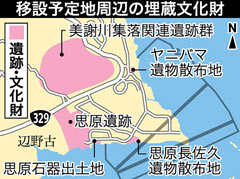Okinawa Board of Education urges Defense Bureau to cooperate with Nago Board of Education for cultural artefacts

The artefacts found inside Camp Schwab, in the area where Futenma Air Station is planned for relocation.
October 24, 2014 Ryukyu Shimpo
The Okinawa Prefectural Board of Education has recommended that the Okinawa Defense Bureau consult the Nago City Board of Education with regards to the conduct of the preliminary investigation and handling of five pieces of cultural artefacts found inside Camp Schwab, in the area where the Futenma Air Station is planned for relocation. It did so by a deadline of October 23.
The Okinawa Defense Bureau had notified Nago City about the commencement of construction works in April 2015. However, the Nago City Board of Education had presented a view that “cultural artefacts must be preserved.” The Prefectural Board of Education determined that no agreement was reached. The buried artefacts were discovered in an onshore operations yard, where temporary passages will be constructed and sand will be obtained for reclamation. There is a possibility that plans for the construction of the replacement airbase may be delayed if there are difficulties with preliminary investigations such as experimental drilling and consultation with the city education board.
It is rare for the prefectural board of education to urge a developer to consult with a local body.
The prefectural board of education’s Cultural Properties Division delivered its recommendation for the Okinawa Defense Bureau through the city board of education on October 17. Typically, a recommendation document recommends one method from the following three methods: (1) Excavation (with records kept); (2) Attendance (at construction); (3) Careful and deliberate construction work. However, because no agreement has been reached between the Defense Bureau and the Nago City Board of Education, no method was specified.
The Prefectural Board of Education judged that “preliminary investigations were insufficient,” recommending that both sides understand clearly the details of the buried artefacts, such as the area in which they are located, after consulting with each other.
Preliminary investigations are normally conducted by municipal boards of education as they are more familiar with local cultural properties. The Defense Bureau can only end negotiations after hearing the Nago City’s views. However, Nago City holds the view that there is not enough time for a thorough investigation before the proposed start of construction in April 2015 because (1) the current preliminary investigations and cooperation are insufficient; and (2) a lengthy period of time is required because of the large area in which investigations must be carried out. If both parties find difficulties cooperating, in addition to delays to the plan for relocation, there is the possibility there might be pressure to re-evaluate the details of the construction work.
(English translation by T&CT and Lima Tokumori)
Previous Article:Three elderly women selected for the fifth Beauty and Longevity Award in Okinawa
Next Article:Symposium aiming to add Okinawa Karate to UNESCO’s Intangible Cultural Heritage list
[Similar Articles]
- Japanese government ignores Okinawa educational board’s opposition to moving Henoko’s hermit crabs
- Okinawa Defense Bureau asks prefectural government to relocate hermit crabs in preparation for Henoko construction
- Ministry of Defense requests permission from Nago City to use Henoko fishing port for reclamation work for new base
- Nago BOE requests cultural property survey to be conducted on Henoko sea area
- U.S. military rejects survey of buried cultural artifacts, cites supplementary agreement
 Webcam(Kokusai Street)
Webcam(Kokusai Street)


